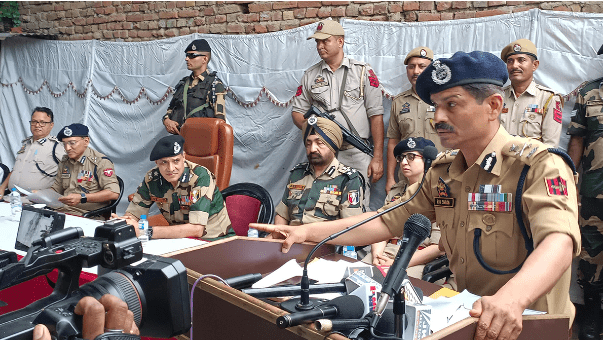‘Helping local defense committees to dissuade terrorists’: DGP, J&K Police

ABOUT THREE DOZEN Pakistani terrorists entered the border areas of Samba, Kathua and Hiranagar through tunnels during the three-month-long Lok Sabha elections to carry out attacks in Jammu. It was a new challenge for security agencies because unlike in the Kashmir valley, where indoctrination drives terrorism, it is the lure of money that is feeding the terror ecosystem in Jammu. “The people who are guiding the terrorists are doing it for money,” says R.R. Swain, director-general of Jammu and Kashmir police, in an exclusive interview. He says the police are focusing on village defence committees and setting up border police stations with night vision devices and better technology to defeat terrorism. Excerpts:
Q/ Many soldiers lost their lives in terror attacks in Jammu recently. Is terrorism back in Jammu after long years of peace?
A/ Terror threats in the Jammu region have been there for some time. In October 2021, we witnessed a terror attack in Poonch district, where five soldiers were killed in an ambush. There have also been drone attacks, including those targeting the Air Force facility in Jammu in June 2021. So it is not a recent phenomenon. For almost three years, the adversary has been trying to deflect the pressure [caused by the] tightening of security in the valley. A suicide attack was planned on the eve of the prime minister’s visit for a rural development programme in the Palli village on the outskirts of Jammu in April 2022. Two foreign terrorists attempted a suicide attack but were neutralised. During the exchange of fire, one CISF assistant sub-inspector lost his life and some others were injured. So Jammu has always been on the radar.
Q/ Is there any evidence of Pakistan support to the terror attacks in Jammu?
A/ How can a tunnel be dug from the other side (Pakistan-occupied Kashmir) without the knowledge or support of the Pakistani army? Usually the length of these tunnels varies between 350 to 600 metres and it will take at least 30 days for digging up. These activities cannot be hidden from anyone as it requires logistical support and manpower to make it operational. There will be enough movement in the area when the terrorists use it and it cannot be done without the knowledge of the Pakistani state.
Q/ It is said that these terrorists belong to the Khyber Pakhtunkhwa region and trained alongside the Taliban.
A/ We know for sure that the two suicide attackers who attempted a terror strike days before the prime minister’s visit to Jammu were non-Urdu and non-Sindhi speakers and in all probability spoke Pashto. Pakistan has a sizeable Pashto-speaking population on its side of the Durand Line even though it is the language of the dominant population in the southern and eastern regions of Afghanistan. These are badlands without any control and these people are battle-hardened. They have trained with outfits like Jaish-e-Mohammed and other terrorist outfits who have openly rallied there in March and April, urging the youth to join them and move into India.
Q/ Is Jammu becoming a fertile ground for radicalised youth who take up arms?
A/ There is less indoctrination and fewer ideology-driven terror activities in Jammu than in Kashmir. Rather, it is the lure of money through narcotics and criminal syndicates that is being used for smuggling of drugs, arms and ammunition that is feeding the terror ecosystem. In Jammu, Kathua and Samba, the people who are guiding the terrorists are doing it for money and gradually a fear factor is inculcated in them as they get indexed in Pakistan once their handlers record their videos and identify their families.
Q/ Will the security environment allow the peaceful conduct of the assembly elections?
A/ As far as providing security is concerned, we are absolutely committed to it and we don’t see that as a challenge. We overcame these threats and challenges during the Lok Sabha polls and the outcome has been extremely positive and encouraging, as a large number of people stepped out of their homes to participate in the electoral process.
Q/ Has the alienation of local people over the years led to human intelligence drying up in J&K?
A/ This theory has no evidence. It is a conjecture because human intelligence is still flowing as it used to be in the past few years. The difference between intelligence gathering in the valley and in Jammu is that while most areas in the valley are connected by road or telecommunication facilities, in mountain regions it takes hours to reach from one spot to another and there is no road or mobile connectivity. Therefore, there is a gap between getting information about the movement of terrorists and reacting to it quickly. This gap between active information and action has to be reduced by way of dominating the heights. Unless we occupy the heights and reach quickly, there is bound to be a time lapse. The J&K Police, like all forces deployed in J&K, has its own challenges of manpower, but efforts are being made to occupy the heights in a way that the enemy does not have an advantage.
Q/ How is the J&K Police engaging the local population in far-flung areas?
A/ We have selected villages where we are supporting village defence committees and setting up border police stations, enabling them with night-vision devices, better equipment and technology to create a deterrent. A village defence committee has approximately fifteen persons, mostly young and able-bodied men who are keen to act as volunteers to assist the local police. We are offering them incentives such as permanent jobs in the police force if they demonstrate courage in collecting information and the action against terrorists and also meet the criteria such as age, height and so on. We also offer liberal cash rewards for doing something that can be directly linked to protection of community, installations and public assets.






